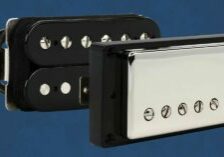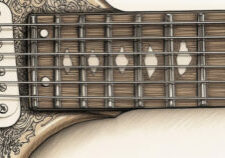Choosing the right gauge of guitar strings is crucial for achieving the desired sound and playability. The gauge of a string refers to its thickness, which affects the tension and tone produced when played. In this article, we will discuss how to choose the right gauge of guitar strings for your playing style.
Understanding the Importance of String Gauge in Guitar Playing
As a guitar player, you know that the strings are one of the most important parts of your instrument. They are responsible for producing the sound that you hear and feel when you play. But did you know that the gauge, or thickness, of your guitar strings can have a significant impact on your playing style and overall sound? In this article, we will explore the importance of string gauge in guitar playing and provide tips on how to choose the right gauge for your playing style.
What does Guitar String Gauge Mean?
Firstly, let’s define what gauge means in terms of guitar strings. Gauge refers to the thickness of the string, measured in thousandths of an inch. The higher the number, the thicker the string. Thicker strings produce a louder and fuller sound but require more finger strength to play.
Common Size of Guitar Strings
The most common gauges for acoustic guitars are light (0.012-0.053), medium (0.013-0.056), and heavy (0.014-0.059). Light gauge strings are easier to play and produce a brighter tone, making them ideal for beginners or players who prefer a softer sound. Medium gauge strings offer a balance between ease of playability and tone quality, while heavy gauge strings provide a rich and full-bodied sound but require more finger strength. The most common size strings for an electric guitar are extra light (0.008 inches) to heavy (0.013 inches). The thicker the string, the more tension it requires to produce sound. This tension affects how easy or difficult it is to play certain techniques and styles. Most guitarists seem to play in the extra light to medium range (.010). Stevie Ray Vaughan was famous for using huge .013 strings.
Your Experience
One factor to consider when choosing a string gauge is your experience. If you are a beginner or primarily play rhythm guitar, lighter gauges may be more comfortable for you as they require less finger strength and allow for easier chord changes. On the other hand, if you are an experienced player who that tends to play heavy rhythm, you might prefer a heavier string.
Your Playing Style
If you’re into blues or jazz music where bending and vibrato techniques are common, you may want to opt for lighter gauge strings that allow for easier bending and more expressive playing. On the other hand, if you’re into heavy metal or rock music where power chords and aggressive strumming are prevalent, heavier gauge strings may be more suitable to achieve a fuller and more powerful sound.
Tuning Matters
Another factor to consider is your preferred tuning. If you tune your guitar down a half-step or more, heavier gauges may be necessary to maintain proper tension and intonation. Conversely, for other tunings, lighter gauges may be more appropriate as they allow for easier fretting and bending. Also, since you usually won’t bend or play a lot of single not leads when using a slide, its fairly common for slide players to use heavier gauge strings when using open tunings.
Personal Preference
Finally, it’s important to consider your personal preferences when choosing the right gauge of guitar strings. Some players prefer thicker gauges for their durability and longevity, while others prefer lighter gauges for their ease of playability. Extra-light gauge strings are great for fast and easy fretting with minimal finger pressure required.
Guitar String Brands
This is a topic where everyone has a different opinion. Here is mine. The old school brands have been making strings for years. So I always look for Ernie Ball Slinky or D’addario XL and go with something like that. I choose the one that is cheapest. Since I have 20 guitars I go through a lot of strings so look for 10 and 12 packs and load up when I see a great deal.
There are premium brands of strings such as Elixir Nanoweb. They are made using a different technology and material. These strings are more expensive but they do tend to last longer. I’ve never felt like it made a big enough difference to be worth the extra cost, but there lots of guitarists that disagree. This may depend on your play style.
Comparison of Popular Guitar Strings
Here is a table with 2 popular inexpensive strings and 2 popular premium, expensive strings.
You Will Probably Change Your Mind
I bet I’ve switched brands a dozen times over the last 30 years. That’s why I suggest trying different brands and playing them awhile. Also, if you switch brands and size, you should give yourself time to really play them. I bought lighter strings, hate them, then went back to .010. Then later wanted to do some serious bends. I bought some .008 extra lights. Hated it for 2 weeks then they grew on me and now that’s what I play. It can take a few days or even weeks to get used to a new gauge, so don’t be too quick to dismiss a particular set of strings if they feel different at first.
When selecting a string gauge, it’s important to experiment with different options until you find the right fit for your playing style. Don’t be afraid to try different brands and materials as well, as these can also affect the overall sound and feel of your guitar. I recommend a .009 light string for a beginner. Its light enough to play anything and the tone tends to be really good. Here is a good video on YouTube discussing the tone of string gauge. While many people think that heavier strings have the best tone, that is not the case at all. Its worth a watch.





